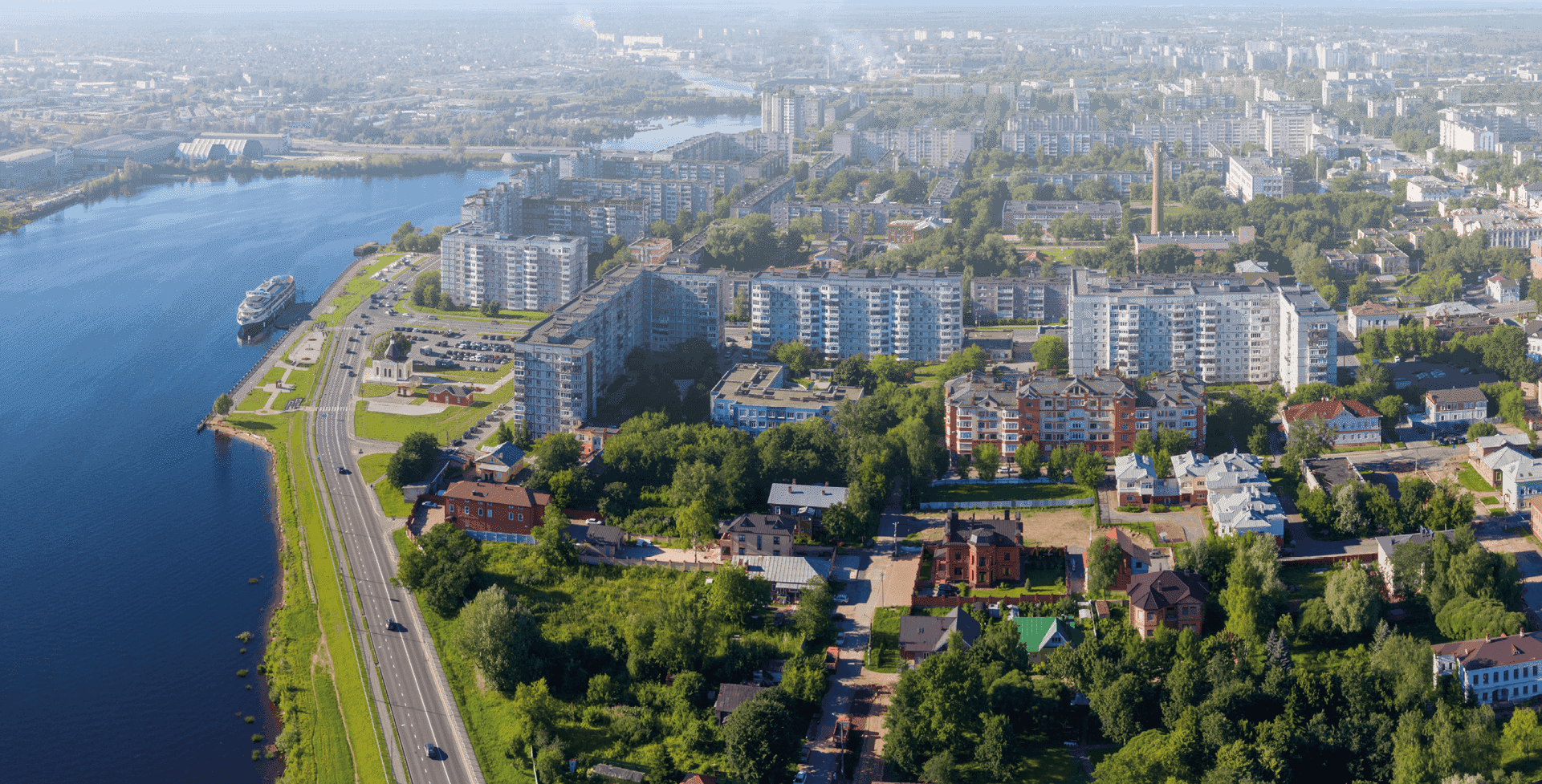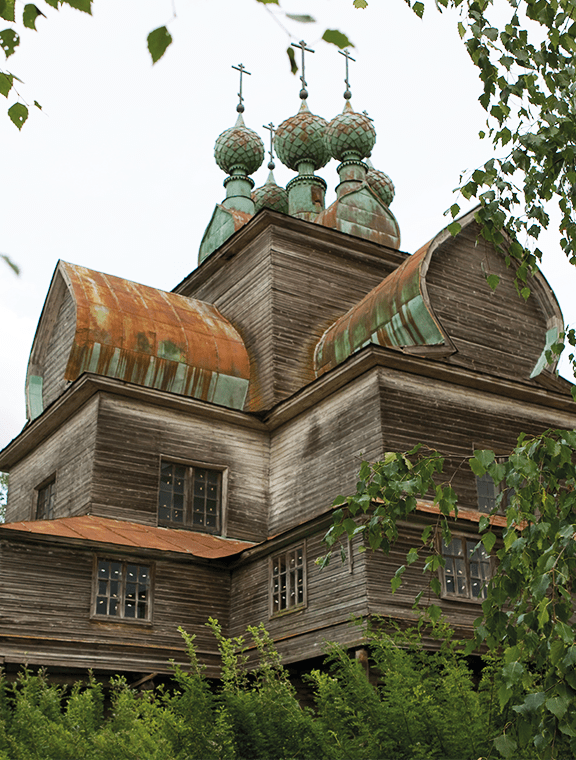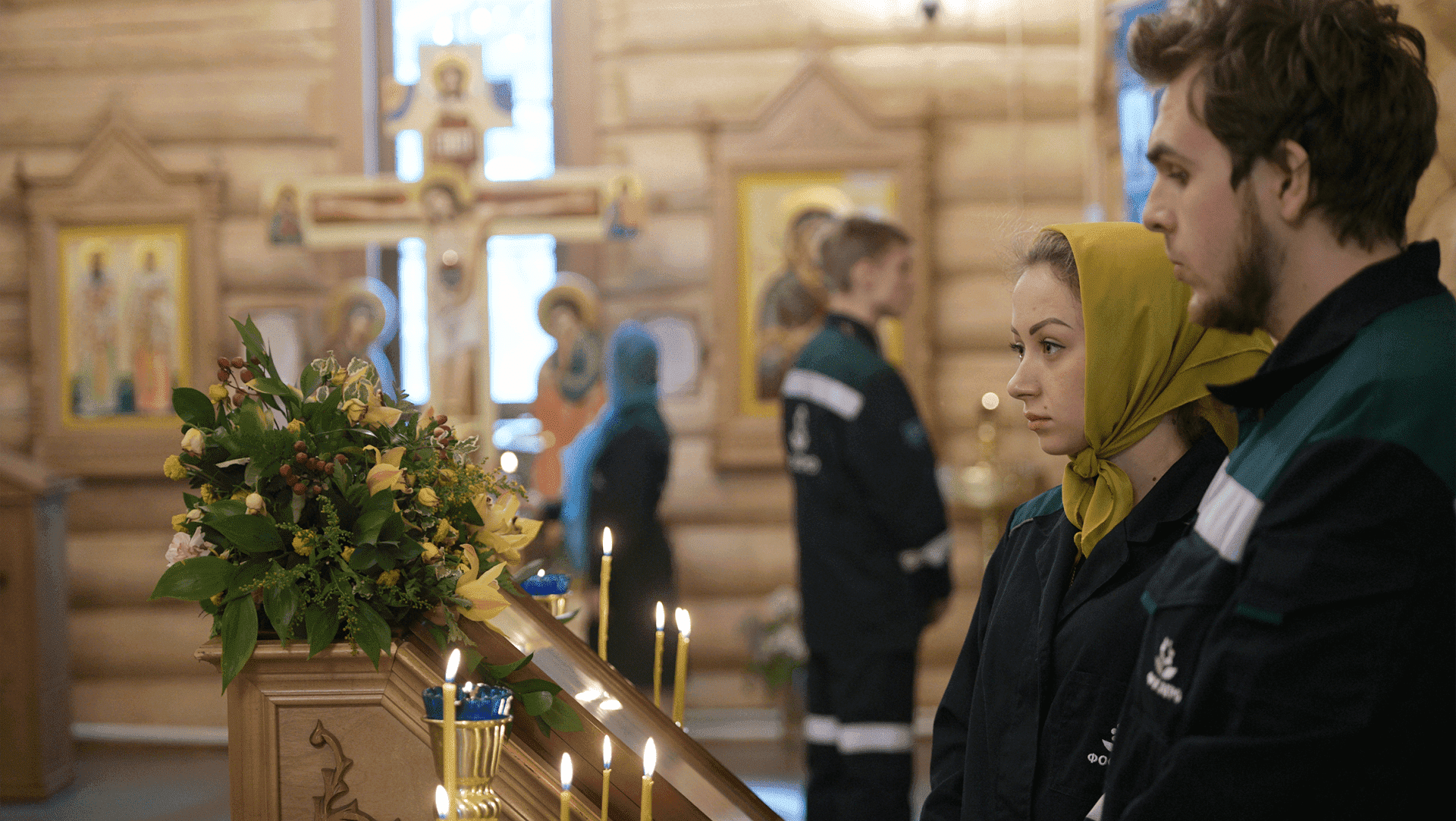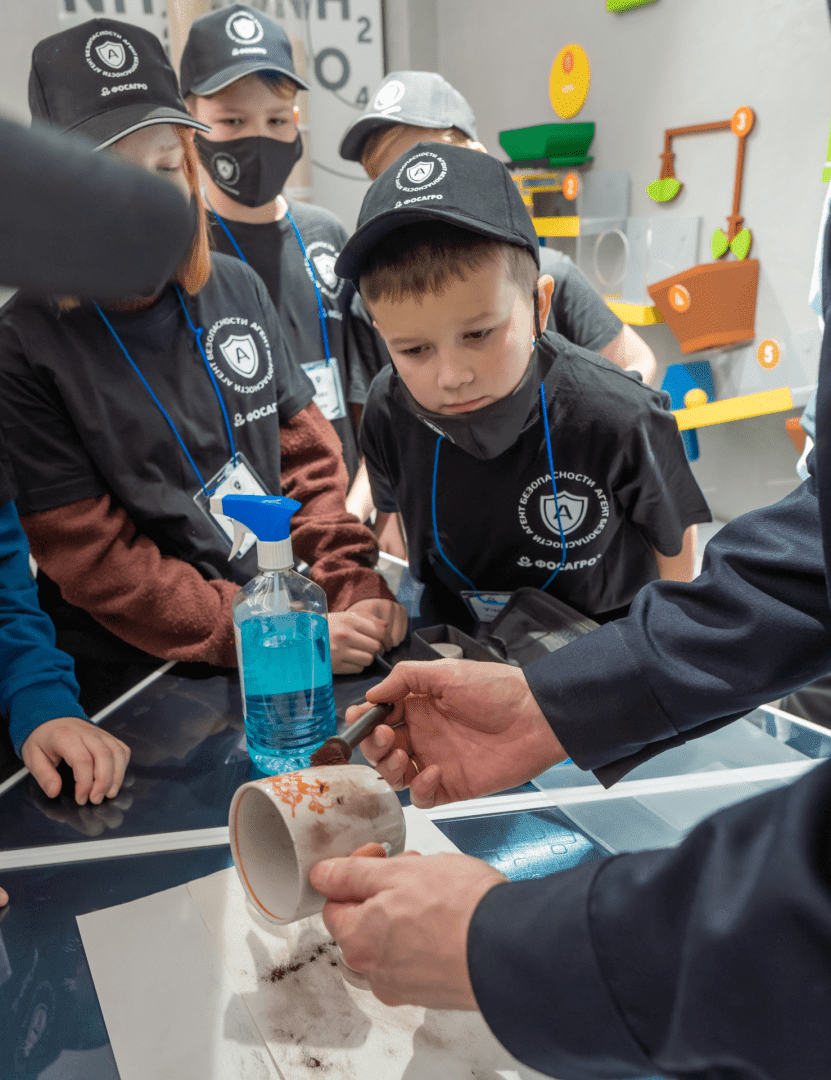Contributing to local communities
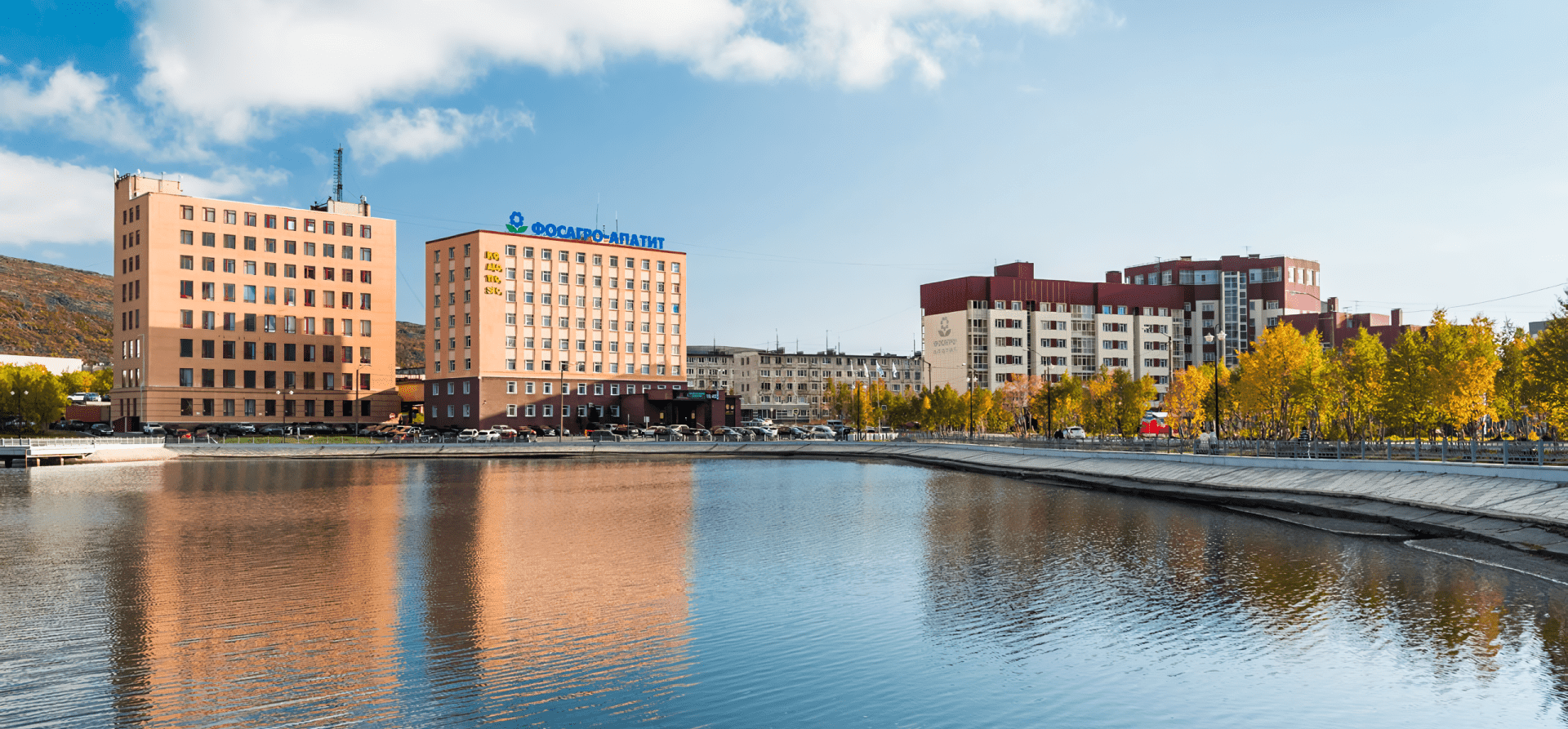
Programmes, strategic goals and metrics
- Improving the quality of urban environment and promoting sustainable development of the cities where we operate: Kirovsk, Cherepovets, Balakovo, and Volkhov.
Key projects and highlights of 2022
Specific activities: support for entrepreneurs in the form of interest-free loans or grants; implementation of the Arctic Entrepreneurship Library project
- Attracting educated, motivated and skilled young talent to innovative Russian facilities, including those of PhosAgro.
- Effective combination of high-quality education and physical training to facilitate moral and ethical development and promote health of the younger generation.
Key projects and highlights of 2022
- Preservation and promotion of orthodox values, spiritual ideas, benevolence and respect for our legacy and motherland.
Key projects and highlights of 2022
Completion of a project to restore mosaic icons of the Holy Trinity Cathedral in Balakovo
Implementation of a project to restore the wooden church of Dormition of the Most Holy Mother of God (17th century) in Nelazskoye (Cherepovets District)
Repair and provision of equipment for the spiritual and educational centre of the Cathedral of the Life-Giving Trinity (Volsk, Saratov region)
Support for a project to develop the Russian Orthodox Centre in Singapore
- Preserving the history of the nation, industry, or facility for all generations; supporting continuity of generations, inclusive traditions, respect for the older generation, veterans, and vulnerable population groups.
Key projects and highlights of 2022
Laboratory of Safety, an interactive multimedia exhibition, created
- Supporting Russian sports at the international, national and regional levels, and promoting sports in regions where the Group operates.
Key projects and highlights of 2022
Total financial support came close toOur strategy is focused on long-term social and economic development programmes in the regions, cities, towns and rural communities in which our key production units operate.
We place a high priority on historical continuity: as a successful enduring partner of local communities in which we operate, we are committed to promoting their sustainable development. While hinging upon long-established social responsibility practices implemented by our production facilities, this partnership is perfectly tailored to meet today’s challenges and relevant stakeholder expectations.
All our programmes and initiatives involving social investments are aligned with the goals and objectives set in the Group’s Strategy to 2025 and contribute to its successful implementation.
identifies the following key areas of social investments:
- education;
- sports and a healthy lifestyle;
- social and spiritual aspects;
- medicine and healthcare.
In 2022, PhosAgro Group once again ranked among businesses with the best social and charitable programmes in the Russian Leaders in Corporate Philanthropy competition. These long-standing awards for socially responsible businesses are organised by the Donors Forum, a coalition of major grantmakers in Russia. In 2022, a total of 60 companies enrolled in the competition, with 39 making it into the final ranking and PhosAgro included in the A+ Leaders category along with eight other companies with the highest score. Showcased by the Cherepovets facility, the Laboratory of Safety exhibition won a social programme award as the Best Programme Contributing to the Achievement of UN Sustainable Development Goals to Ensure Health, Healthy Lives, and Well-Being to Promote Sustainability.
We implement regional development projects with a special focus on:
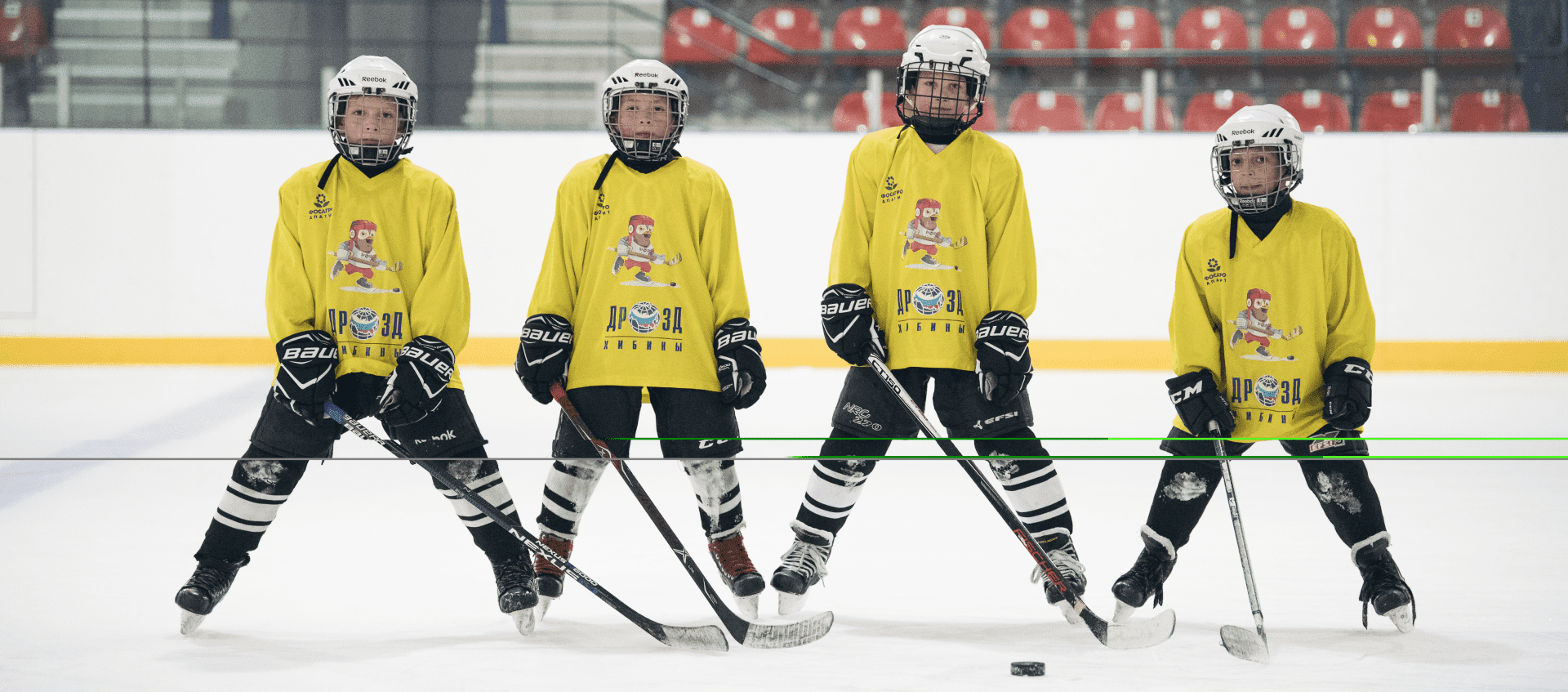
Our social investment programmes are based on public benefit priorities and mostly rely on opportunities to partner with regional and local government authorities, local communities, non-governmental organisations, including non-profit organisations established by the Company to this end, educational institutions and other stakeholders.
We implement our social investment strategy through promoting efficient and successful cooperation with a broad range of partners in line with the highest international sustainable development standards.
The key principle underlying our interaction with local communities is a meaningful dialogue through a variety of communication channels, from public hearings and the involvement of Company representatives in the work of local legislative and representative bodies and government authorities to setting up community liaison offices and other venues for meetings with people.
Key policies and regulations
All of the Group’s social investment projects and initiatives are implemented in accordance with the requirements of the Federal Law on Charitable Activities and Charitable Organisations, and other applicable laws and regulations.
To ensure transparent and effective corporate governance, the Group has developed a framework of internal regulations governing charity and sponsorship, including:
Performance assessment and feedback
We focus heavily on evaluating the results of our social investment programmes. Assessment criteria include both objective data and stakeholder views, thus ensuring comprehensive performance assessment and monitoring the evolution of public priorities related to social and economic development.
In 2021, we partnered with the Donors Forum to run an exhaustive stakeholder survey and evaluate charity programmes and projects implemented in the regions of our footprint and supported by PhosAgro Group. Building on that, in 2022 we reviewed our internal documents to develop and approve criteria and procedures for the assessment of community social programmes. The sets of criteria for each of them are available on the Company’s website. Our 2022 performance for some of the key criteria is shown below for each specific programme.
We also collect a considerable amount of data used for analysing the effectiveness of our social investment programmes from the ongoing stakeholder feedback, including corporate newspapers, TV broadcasts, and social networking. Local residents in communities where we operate voice their grievances and comments using the Company’s website; social networks; liaison offices of deputies who are also the Company’s employees; public hearings on various aspects; and public meetings organised at public sites. As an example, in Volkhov, the Company with support from its government relations team started holding regular meetings with local residents to discuss various matters at a local community centre. The first meeting was held in 2022, with the Company’s social projects presented and showcased to local residents.
Also, the Company’s employees have been elected to various regional and local legislative bodies. Our work in these bodies provides us with information on the most urgent issues faced by local authorities. We include them in the agenda of joint working groups which discuss the methods and mechanisms for addressing the issues.
For information on other feedback mechanisms, see the description of specific projects.
Our social investment objectives are affected among other things by the following strategic risks:
The Company develops corrective measures as necessary and unlocks opportunities to mitigate those risks. Below you can find more information about what we do on this front.
Social investment specific risks are listed below:
PhosAgro Group makes an extensive and diverse contribution to the social and economic development of local communities in the regions of our presence: we pay taxes to local budgets, create stable and well-paid jobs for local people, and place regular orders with local businesses. As a responsible long-term partner, we also allocate significant funds to support local communities, contribute to charitable causes and develop infrastructure. Stable and successful home regions are a key driver of PhosAgro Group's sustainable development.
Our Favourite Cities initiative is implemented under social and economic partnership agreements signed with the authorities and is financed in line with the Company's social policy for a particular municipality based on the results of comprehensive social surveys and identification of major social problems and development potential of the territories.
Partnership and ongoing meaningful dialogue with stakeholders allow us to fine-tune our social programmes to better align them with focuses of regional development and invest more efficiently.
The Company traditionally supports a range of initiatives aimed at promoting entrepreneurship. In 2022, a competitive corporate-city project Making Our City Better Together! was established in Cherepovets, which included training for potential participants representing small private businesses to help them learn the rules of applying for the project. The initiative is implemented in cooperation with regional and local government authorities, non-governmental organisations and civil society.
In Kirovsk, Murmansk region, the project of the Kirovsk Tourism and Entrepreneurship Development Agency (formerly Khibiny Business Development Centre), a project supported by the Company, is underway. Its main activities include providing new and existing entrepreneurs with training and grant support awarded on a competitive basis. The Kirovsk Tourism and Entrepreneurship Development Agency assists in obtaining regional and federal grants through the Regional Small Business Support Fund and other grant providers. In addition, 2022 saw the implementation of the Arctic Entrepreneurship Library project.
entrepreneurship in the Murmansk region in 2021–2022:
In November 2022, the first stage of the Northern Ring Road was inaugurated in Cherepovets. The project was completed with funding from regional and municipal budgets and financial support from PhosAgro Group and Severstal. A quadripartite co-financing agreement was concluded, making it the first major public-private partnership project in the Vologda region. The Company invested RUB 171.6 mln in the road construction.
According to a sociological survey conducted in the reporting year and feedback collected in social networks, residents of the Vologda region are generally satisfied with urban improvements currently taking place in the region. Comments of city residents regarding the need to maintain improved areas in due state are taken into account when creating PhosAgro Group's municipal programmes and charitable initiatives.
In 2022, Apatit provided financial support to build a sports ground and install professional sports equipment in a Balakovo public garden garden near the Olympic sports school in Balakovo. Initiated by a group of locals, the project became a successful example of involving the public and businesses of Balakovo in social development. The project’s total cost stood at RUB 10.6 mln. The sports ground is the only one in the island part of Balakovo with this level of equipment.
According to a sociological survey conducted in the reporting year and feedback collected in social networks, residents of the Balakovo municipal district are generally satisfied with the urban improvements currently taking place in the region.
In 2022, a concept for the development of the Kirov public garden in Volkhov was drawn up, featuring new locations for active and passive recreation activities, an alley with information and history boards, an amphitheatre, outdoor chess tables, a stage and even an urban vegetable garden. The initiative to create a vegetable garden/greenhouse with corporate design where PhosAgro Group’s fertilizers will be used to grow agricultural products won the second place at the Young Manager – 2022 corporate competition.
According to a sociological survey conducted in the reporting year and feedback collected in social networks, residents of the Leningrad region are generally satisfied with urban improvements currently taking place in the region.
The key project in 2022 was PhosAgro's co-financing of the overhaul of the street and road network in Kirovsk. The main objective of the project is to improve traffic safety in the town by enhancing road infrastructure, among other things in order to further boost Kirovsk's appeal for tourists. In addition, the access to the Kirovsky mine was improved, reducing travel time and increasing the safety of our employees and all residents of the Kukisvumchorr neighbourhood (about 5.000 people).
We participate in a public-private partnership to develop the Khibiny tourist cluster, including the Bolshoi Vudyavr Ski Resort. In particular, the construction of the second stage of an artificial snowmaking system on the resort's northern slope continued in 2022. In November 2022, Bolshoi Vudyavr was named the best ski resort in the Northwestern Federal District by the Russian Mountains national award. All of the resort’s sports facilities are certified by the International Ski Federation (FIS).
Results of a 2022 sociological survey:
- about 77% of the respondents positively evaluated changes in the appearance of Kirovsk;
- about 57% of those surveyed positively rated the safety and quality of roads;
- 81% of respondents are happy with the condition of sports infrastructure;
- about 63% consider the town to be a tourist attraction;
- level of healthcare, housing, and utilities are areas for improvement.
As part of our unique multi-stage education support programme along the school–college/university–enterprise pathway, we implement career guidance projects for schoolchildren. In the field of personnel training, we cooperate with educational institutions in the cities and towns where we operate, as well as in Moscow, St Petersburg, Ivanovo, Kazan and more.
Covering all levels of education, this programme supports promising future professionals at each stage of the school–college/university–enterprise track.
In addition to financial support and assistance in building renovations provided to the schools, the project offers advanced programmes in natural sciences, economics, and management. According to an annual survey of PhosAgro Schools students:
- almost half of the students – 49% – say that PhosAgro Schools give them more chances and opportunities to enter a specialised university than other schools. 32% of students consider PhosAgro Schools prestigious and enjoy the educational process. 23% say that PhosAgro Schools increase their chances to join the Company. 8% say that PhosAgro Schools offer more sporting opportunities than other schools;
- degree of parents’ and students’ satisfaction with the level of teaching at PhosAgro Schools is quite high: 90% of students say they are satisfied with the teaching of almost all subjects.
We provide the country's leading technical universities with funds for equipment and supplies and participate in adapting educational programmes to the needs of modern production facilities. Students of PhosAgro Group's partner vocational schools and universities are offered internships at the Company, and the most promising students get employment opportunities at the Group's facilities.
Since 2013, PhosAgro has been implementing a comprehensive programme of cooperation with the Cherepovets College of Chemistry and Technology (CCCT), where the Group supports activities of a specialised department of the Ivanovo State University of Chemistry and Technology providing training for students and employees of PhosAgro's facilities.
In February 2022, following an offsite meeting held by the Russian Federation Council Committee on Science, Education and Culture in Kirovsk, the committee recommended that the Russian Government take into account the Company's experience in training skilled engineers and workers using the school–college–university–enterprise educational pathway when creating the Professionalism federal project and education and production clusters in key industries such as chemical, light industry, metallurgy, etc.
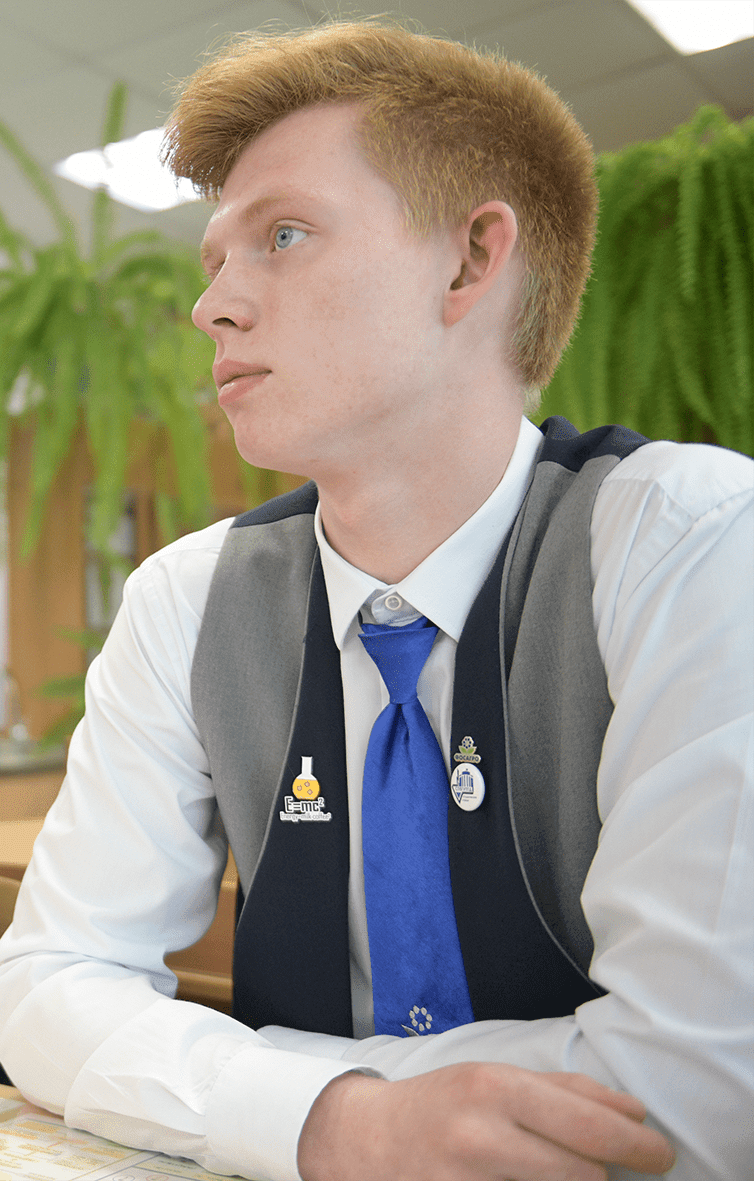
At PhosAgro, we believe that the development of education in the agribusiness sector is a crucial factor in supporting and enhancing the robust growth that Russian agriculture has been delivering in recent years. We are focused on fostering the right conditions for that by developing professional competencies of students and teachers at agricultural universities, as well as of agricultural producers and agro-industrial technology service providers.
The main mechanism for this is the consolidation of resources within PhosAgro Group's Education Centres at Russia's leading agricultural universities. In 2022, the programme reached a new level with the opening of nine new centres in the country’s key agricultural regions. Today, PhosAgro Group's educational centres operate at Russian State Agrarian University:
- Moscow Timiryazev Agricultural Academy,
- Saratov State Agrarian University,
- Urals State Agrarian University;
- St. Petersburg State Agrarian University;
- Kursk State Agricultural Academy,
- Belgorod State Agricultural University,
- Kuban State Agrarian University,
- Orel State Agricultural University,
- Voronezh State Agricultural University,
- Penza State Agrarian University
- Ryazan State Agrotechnological University.
In 2021–2022, PhosAgro's Education Centres held over 200 online lectures for 30 agrarian universities in Russia and the CIS. A total of 22,700 students and teachers attended the lectures, which covered topics such as agrochemistry and agronomy, crop production, innovation and digitalisation of agriculture, economics, law, and responsible farming.
Capabilities for conducting scientific experiments were set up at PhosAgro Educational Centre’s Phyto-Class of Moscow Timiryazev Agricultural Academy, including those for students’ thesis projects. In addition, the Company together with Timiryazev Academy work to provide career guidance to schoolchildren, organise lectures and conferences, additional professional education courses, open days with major employers and meetings for young scientists.
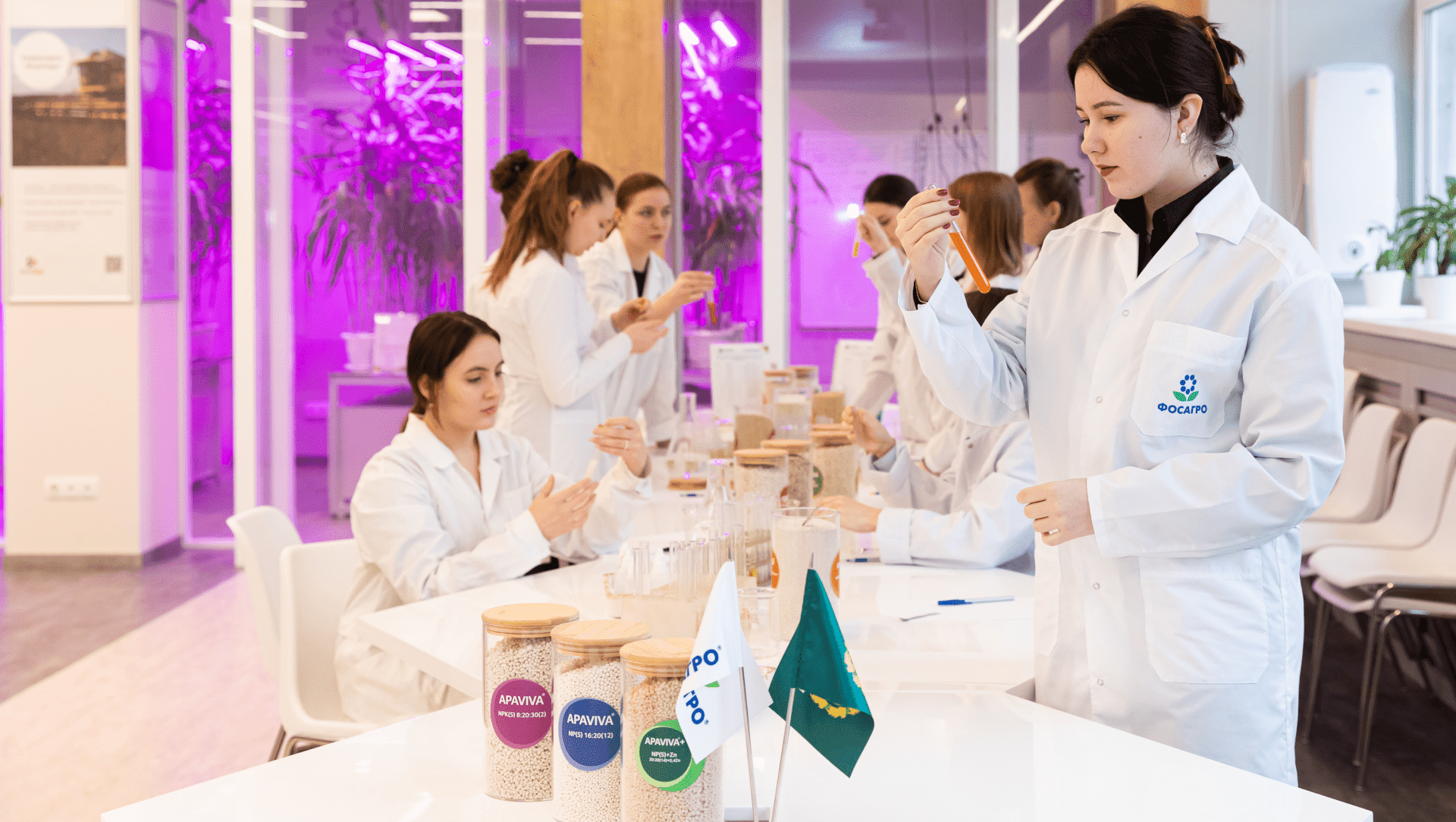
(Educated and Healthy Children of Russia)
DROZD, a unique corporate project, addresses the social issues associated with keeping children busy outside school hours in the cities and towns where PhosAgro operates. The Company has taken on a significant share of responsibility for their upbringing, education, and sporting development, so that parents can work comfortably knowing that their children have everything they need for their intellectual and physical development.
The project is a comprehensive system of multi-faceted long-term interactions with children aged 4 to 18 that harmoniously combines sports, spiritual, and patriotic education. To facilitate the DROZD programme, operators (independent non-profit organisations) have been established in four cities where PhosAgro operates: DROZD-Balakovo (Saratov region), DROZD-Cherepovets (Vologda region), DROZD-Khibiny (Kirovsk, Murmansk region) and DROZD-Volkhov (Leningrad region).
In 2022, the project covered more than 7,000 children (including 170 physically disabled and handicapped ones) who practised more than 20 athletic disciplines in 70 sports classes. Over 50% of the students passed various levels of the GTO fitness tests, with 29% of the children with disabilities at the DROZD-Cherepovets site passing the tests under the GTO Without Borders project. More than 40% of the students are winners and runners-up in sporting events at the municipal, regional, and federal levels.
In addition, DROZD established ten non-sports clubs as well as hobby groups for popular science, patriotic and preliminary military training, fitness, Media School, robotics, etc.
In 2022, DROZD was presented at the Best Practices in Promoting Physical Culture and Sports session of Russia – Country of Sports, the X International Sports Forum.
In 2022, raised funds accounted for 23% of the project's total funding, which demonstrates the popularity of DROZD and confirms keen interest in the project from local residents and regional authorities.
Surveys show a growing number of positive reviews, in particular from parents regarding the organisation of recreational and sports activities (e.g. summer camps in the Vita health resort in Anapa and the annual awards ceremony of the Best DROZD students). An important fact is that more than 50% of DROZD students who took part in the survey appreciated the quality and level of equipment in the gyms. According to a parent survey, almost 50% of parents expect DROZD sports clubs to improve their children's health. There was a considerable increase in the number of parents interested in their children's sporting achievements.
In 2022, the DROZD Village project (running since 2016) was awarded in the Sports for Everyone, Best Organiser of Physical Culture and Sports in Rural Areas categories, according to the National Sports Award. The project covers twelve villages in the Saratov region and offers more than 500 rural students an opportunity to do sports. Necessary infrastructure is created in rural locations, sports clubs are opened and mass sports events are held. More than 30 sports clubs are available to DROZD Village students for sports activities free of charge.
An important feature of the project is continuous health monitoring based on the Health Navigator methodology. It helps teachers and parents to adapt educational activities as closely as possible to specific requirements of a child’s body.
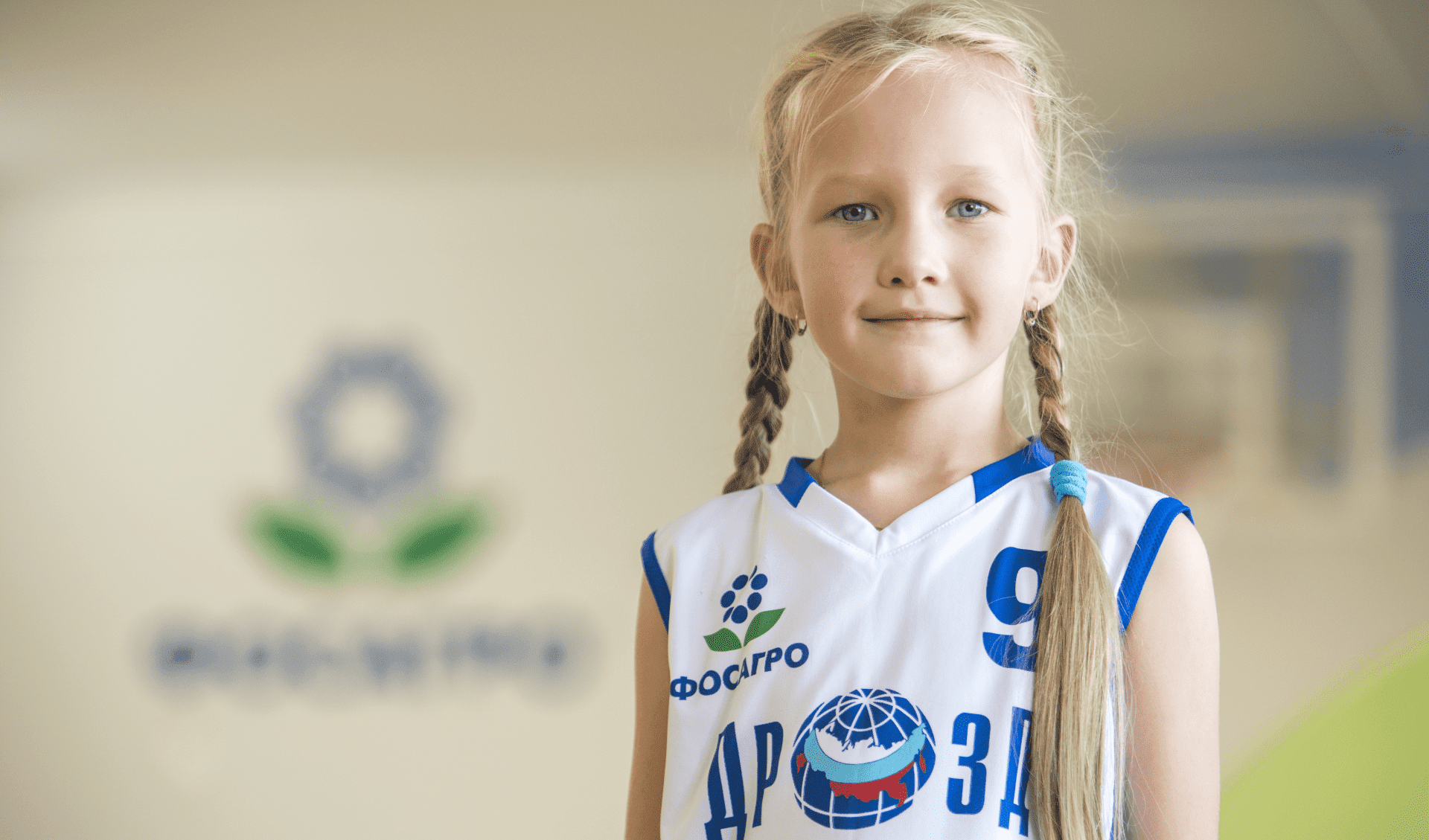
The main objective of the programme is to preserve and promote orthodox values, spiritual ideas, and respect for our legacy and motherland.
The programme has been underway since 2001 and is implemented in cooperation with the Russian Orthodox Church, regional and local government authorities, non-governmental organisations and civil society.
The Company organises biannual pilgrimage tours to the relics of St Nicolas the Wonderworker for Russian believers. PhosAgro Group supports the project to develop the Russian Orthodox Centre in Singapore. The Group provides assistance to the exarchate of the Russian Orthodox Church in Southeast Asia.
The restoration of the unique mosaic icons of the Holy Trinity Cathedral in Balakovo, which began in 2018, was completed in 2022. In June, the Sign mosaic on the north side of the building was consecrated. Also, in 2022, work began on the Calvary mosaic panel, which will be placed on the west side of the church. Such was the intention of Fyodor Schechtel, a prominent architect of the early 20th century, and now his ideas are to be brought to life by the outstanding Russian mosaic artist Igor Lavrenenko. In addition, in 2022 PhosAgro financed the restoration of the cathedral's fence.
With the Company's organisational support, the restoration of a church of Dormition of the Most Holy Mother of God (built in 1694) in the Nelazskoye village, a unique monument of wooden architecture, is underway. PhosAgro also helped renovate and equip the spiritual and educational centre of the Cathedral of the Life-Giving Trinity (Volsk, Saratov region).
The main goal of the programme is to preserve memory of the history of the nation, industry, or facility for all generations; traditions of respect for the older generation, veterans, and vulnerable population groups.
Career guidance and exhibition centres are located in all of the four key cities across our footprint and represent a combination of a modern multimedia corporate museum and an innovative and interactive popular science centre offering advanced programmes in chemistry, biology, and related professional training. The centres are equipped with virtual and physical science laboratories designed to prepare a variety of chemical compounds, multimedia microscopes with 50.000x power, and an interactive garden where students can watch educational videos on cell life and structure and do lab experiments. There are panoramic cinemas offering career guidance and educational films, sensor tables with geographic data on minerals and countries around the world, and sensor booths to test professional aptitude. The centres are very popular with schoolchildren for being the place to learn about different professions and a major attraction for teenagers combining cultural entertainment and intellectual pastime.
- Museum and exhibition centre for interactive education of Apatit in Kirovsk;
- Fifteenth Element, a museum and exhibition centre in Volkhov;
- Green Planet, a centre for interactive education in Cherepovets;
- Academy of Fertility, a museum and exhibition centre in Balakovo.
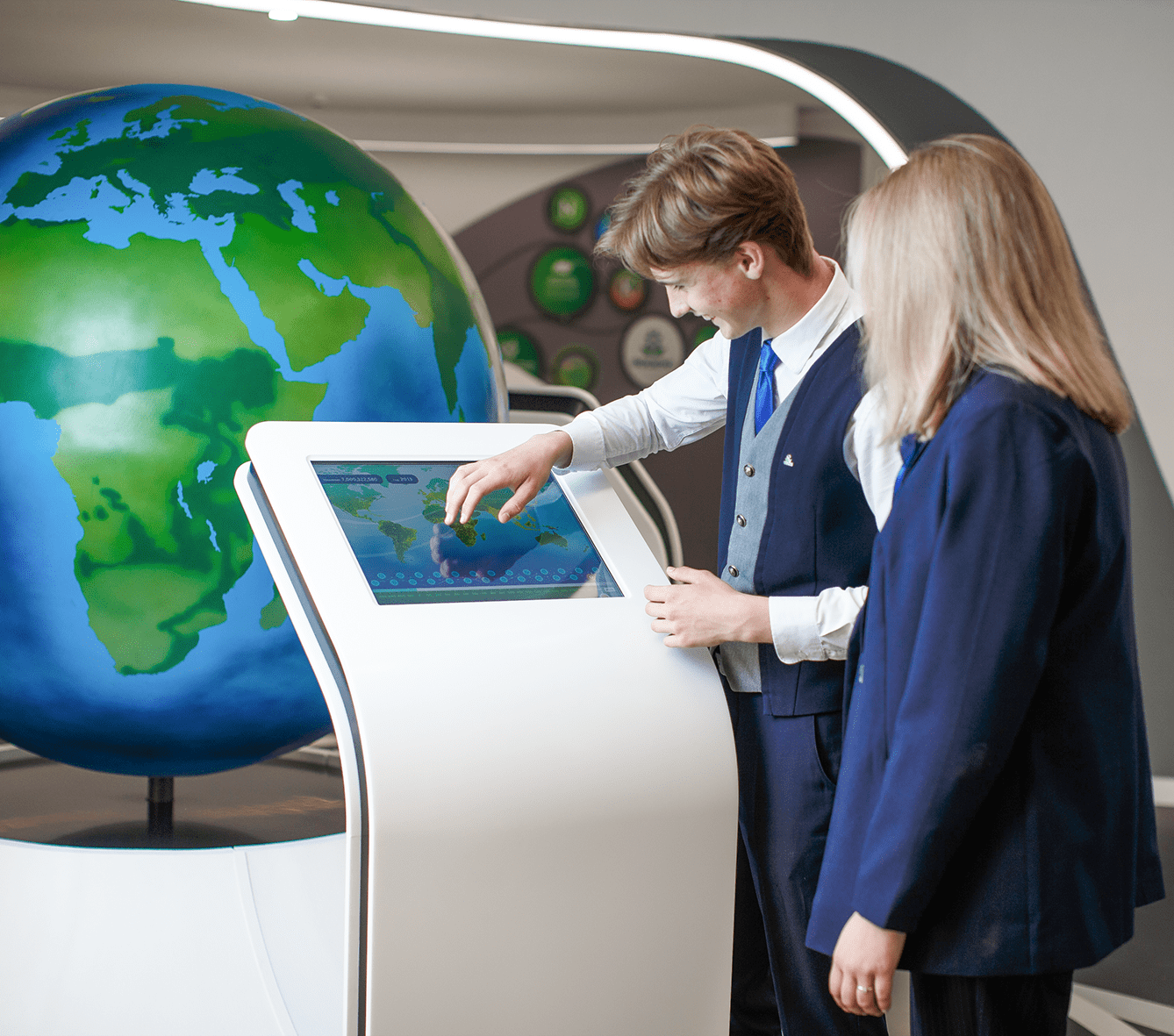
In 2022, PhosAgro continued a unique project for schoolchildren which was initiated by the Cherepovets facility and enlisted the support of Apatit's Economic Security Department and the Ministry of Internal Affairs’ Office in Cherepovets.
The project achieved the following results:
- Laboratory of Safety, an interactive multimedia exhibition, created;
- security and safety training courses developed for different categories (including children);
- the first issue of Security Agents, a magazine for teenagers (12+), published, and three more issues are slated for 2023;
- Security Agents, a media school, set up, seeking to provide an in-depth insight into security and safety issues and promote safe behaviour;
- five episodes of The Kislov Family, a cartoon for children (6+), filmed to reveal the problems of modern society and show how to avoid them;
- a travelling safety exhibition developed; in 2023, the exhibition will travel across Cherepovets and the Vologda region, Volkhov and Balakovo;
- project experience was rolled out at PhosAgro's Balakovo and Volkhov sites of Apatit.
- winner in the Best Museum Event category for the project in the Corporate Museum competition;
- winner as the Best Programme Contributing to the Achievement of UN Sustainable Development Goals to Ensure Health, Healthy Lives, and Well-Being to Promote Sustainability in the Russian Leaders in Corporate Philanthropy competition.
A combination of targeted assistance to public organisations and support for volunteer initiatives in the regions of operation.
The programme supports 24 non-governmental organisations of labour and war veterans, as well as a number of charities.
In particular, PhosAgro supports ten non-governmental organisations in Cherepovets, including In the Name of Good charity, the Cultural and Recreational Centre in the Northern Microdistrict, and veteran organisations.
In Kirovsk and Apatity, we provide support to six non-governmental organisations, including a volunteer centre for the Group's pensioners.
We also support four local non-governmental organisations in Balakovo and Volkhov, respectively.
The Company’s volunteers organised 175 events to provide assistance to veterans, the elderly, and vulnerable social groups in 2022.
Apart from that, the volunteers' activities include interaction with orphanages (in particular, making friends with children, helping them to socialise and prepare them for independent life outside the institution), as well as environmental initiatives. Members of the youth organisation also help an animal shelter. Another important area of volunteer activity is assistance to the Company’s veterans, primarily those who are single.
- financial aid;
- health resort treatment;
- mass cultural events, excursions, entertainment.
Support for Russian sports at the international, national and regional levels, and promoting sports in regions where the Group operates.
We believe that supporting the first steps of young athletes in the cities of our presence is just as important as contributing to the success of record holders.
Apart from DROZD, the Company provides assistance to 21 sports organisations at the federal, regional, and municipal levels.
- Russian Olympians Foundation:
- Russian Rhythmic Gymnastics Federation;
- Russian Cross-Country Skiing Federation;
- Russian Chess Federation;
- Russian Rugby Federation;
- Moscow Rhythmic Gymnastics Federation; Academy of Fertility, a museum and exhibition centre in Balakovo.
- Proton Volleyball Club;
- Avtodor Basketball Club (Saratov region);
- Turbina speedway team (Saratov region);
- Severyanka Volleyball Club (Vologda region).
The Company also continued to support local organisations: youth sports schools, sports associations and clubs.
